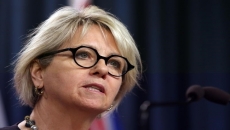Thirty registered nurses and registered psychiatric nurses in British Columbia are expected to complete their training this month to prescribe medication to those battling addiction to opioids.
Provincial health officer Dr. Bonnie Henry says more than 6,000 people have died from overdoses since B.C. declared a public health emergency nearly five years ago, but the pandemic has increased the risk of overdosing.
Training RNs & RPNs to prescribe pharmaceutical alternatives to street drugs will save lives. We applaud this innovative work and believe long-term investments are needed to build a solid system of mental health and addictions care: https://t.co/Vfs0bpcqnC
— BC Nurses’ Union (@BCNursesUnion) February 8, 2021
She issued a public health order last September authorizing the nurses to prescribe some controlled drugs and substances as part of the effort to reduce overdoses and deaths.
Henry says in a release that while the overdose crisis is not unique to B.C., the province is the first in Canada to equip registered nurses and registered psychiatric nurses to join family doctors, psychiatrists and nurse practitioners in prescribing medication.
The Mental Health and Addictions Ministry says more of the nurses will be trained to prescribe medications such as suboxone to those in the grip of addiction.
It says other medications will be added to the training, including morphine and methadone.
A spokeswoman for the College of Nurses and Midwives, which regulates standards of practice, says nurses could start prescribing the medications by the end of the month.
Mental Health and Addictions Minister Sheila Malcolmson says too many people have been left grieving the loss of someone who died of an overdose.
"Expanding access to addiction treatment medications is essential to getting a handle on this crisis," she says.
Turning Point Recovery Society provides #recovery services that are a vital part of the broader #substanceuse continuum of care. My thanks to Brenda Plant for her longstanding dedication to the treatment and recovery sector. @turningpointrs pic.twitter.com/T332n1X7fK
— Sheila Malcolmson (@s_malcolmson) February 8, 2021
The ministry says the first group of nurses represents every health region and the training is in addition to work being done to expand access to pharmaceutical alternatives to toxic street drugs.
Kate Hodgson, a registered nurse and consultant on substance use with the Four Directions Team that is part of the First Nations Health Authority, says the training initiative will improve access to life-saving medication.
She says nurses will have the opportunity to support access to the full spectrum of substance use care for rural and remote Indigenous communities.
"The Nation-based health centre teams and (the First Nations Health Authority) community health nurses who have taken on nurse prescribing are creating innovative programs from a place of wellness, compassion and self-determination."
The Mental Health and Addictions Ministry says more than 23,000 people in B.C. are currently receiving some form of treatment for opioid use.
Health officials say street drugs have become more potentially deadly during the pandemic because border closures have meant the toxic substances are being locally produced.
.jpg)





